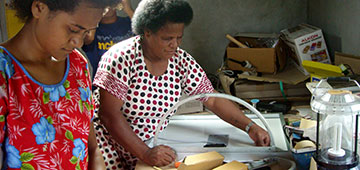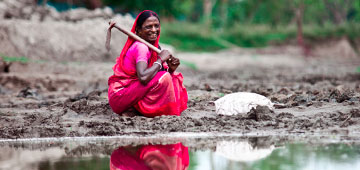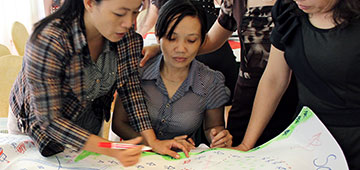Women and the environment

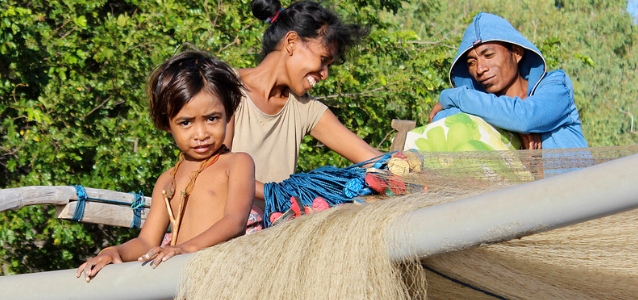
 As debate on climate responses persists, water levels rise and climate change is causing destruction around the world. Among the most affected are women, as they gather water, fish, or farm land affected by flooding. During pregnancy and motherhood, their health is more at risk. Meanwhile, their voices are often the last to be heard in environmental planning and management. They also have less access to land and productive resources.
As debate on climate responses persists, water levels rise and climate change is causing destruction around the world. Among the most affected are women, as they gather water, fish, or farm land affected by flooding. During pregnancy and motherhood, their health is more at risk. Meanwhile, their voices are often the last to be heard in environmental planning and management. They also have less access to land and productive resources.
This year, as the UN observes the International Year of Small Island Developing States, the theme of World Environment Day (5 June) is “raise your voice, not the sea level”. Here, we take a look at how women can and do make a difference. While not always recognized, women play a crucial part in ensuring that fragile ecosystems are protected, families are able to survive natural disasters, and natural resources are managed in a fair, efficient and sustainable way. Although women have proven their skills in managing natural resources and adapting to climate change, their contributions are often taken for granted or not valued.
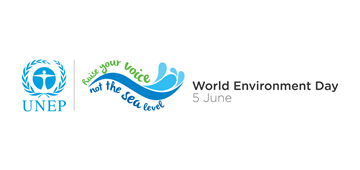 Women and the environment is one of the 12 critical areas of concern identified in the Beijing Declaration and Platform for Action, adopted by global leaders at the Fourth World Conference on Women in 1995. The Platform pinpointed three strategic objectives for government action on the environment. These include involving women actively in environmental decision-making at all levels, integrating their concerns and perspectives in policies and programmes, and establishing ways to assess the impact of development and environmental policies on women.
Women and the environment is one of the 12 critical areas of concern identified in the Beijing Declaration and Platform for Action, adopted by global leaders at the Fourth World Conference on Women in 1995. The Platform pinpointed three strategic objectives for government action on the environment. These include involving women actively in environmental decision-making at all levels, integrating their concerns and perspectives in policies and programmes, and establishing ways to assess the impact of development and environmental policies on women.
Nearly 20 years later, women are making inroads and governments are increasingly seeking out their expertise and leadership when making key environmental decisions. Still, much remains to be done to support women’s roles in decision-making and secure a better future for all. To this end, the UN is working to place women at the forefront of sustainable development and efforts to confront the effects of climate change.
Fast facts
Did you know?
- Some 2.5 billion people – two-thirds of whom live in Asia, and a quarter in sub-Saharan Africa – still use unimproved sanitation facilities and 748 million people are without clean water.
- If you think about it, that’s a sizeable chunk of the world’s population (more than 7 billion, in case you are wondering!).
- There’s more: Women and girls are disproportionately affected.
- How so? The distances travelled, especially in unprotected areas, to get water and the lack of safe, private toilets make women and girls more vulnerable to violence. This can also be an impediment to girls’ education and takes time away from income-generating activities.
- Women and girls also bear the main burden of water collection in developing countries. In fact, an analysis of 25 countries in sub-Saharan Africa revealed that 71 per cent of the water collectors in the region are women and girls, and in just one day women collectively spend an estimated 16 million hours fetching water (men, 6 million in comparison).
- We did the math: 1 million hours = 114 years = more than a century! Now, times that by 16… WHAT?!
- The next time you grab a glass of water or walk on over to the bathroom, remember:
- Sustainable development solutions can dramatically improve the lives of women and girls.
- So what are you waiting for? Let’s go green. Empowering Women – Empowering Humanity: Picture It!
Sources:
- Progress on drinking water and sanitation, Joint Monitoring Programme update 2014, WHO, UNICEF, 2014
- The Millennium Development Goals Report, United Nations, 2012
Editor's picks
Putting women at the forefront of climate change and disaster response in the Pacific
Where: Fiji and Tonga
Organization: UN Women
Whether training women solar engineers in Fiji or assisting with the humanitarian response plan after a major cyclone in Tonga, UN Women is working with climate-change and disaster-management professionals across the Pacific.
Families in Bangladesh Learn to Cope with Storms and Cyclones
Where: Bangladesh
Organization: World Food Programme
Confronting the effects of climate change, women gain skills in disaster-preparedness on low-lying coastal plains of Bangladesh. Some 4,500 women and men are building their resilience to natural disasters, enhancing food security and adapting homes to withstand climate-related shocks.
Lives saved in Viet Nam by involving women in disaster planning
Where: Viet Nam
Organization: UN Women
Through the training of women in disaster management, as well as national lobbying, the contribution of women has been recognized and a government decree now gives the Women’s Union an official space in decision-making bodies.
Momentum for Change, Women for Results
Where: Global
Organization: UNFCCC
Across the globe, women play an essential role in tackling the climate change challenge. They are taking action to reduce greenhouse gas emissions by leading initiatives that promote new solutions to addressing climate change, while providing economic benefits to communities around the world. They are also promoting transformative partnerships that help to adapt to the effects of climate change and build resilient societies.
Resources
- The Future Women Want: A Vision of Sustainable Development for All (UN Women, 2012)
- Rio+20 Outcome document (UNCSD, 2012)
- End Open Defecation (United Nations Millennium Campaign, Water Supply and Sanitation Collaborative Council (WSSCC), United Nations Department of Information, UNICEF, Water Aid, 2014)
- World Water Development Report 2014 - Water and Energy (UNESCO, 2014)
- WHO/UNICEF Joint Monitoring Programme (JMP) for Water Supply and Sanitation (WHO/UNICEF, 2014)
- Women and Natural Resources in Peacebuilding (UNEP, UN Women, PBSO, UNDP, 2013)
- Powerful Synergies: Gender Equality, Economic Development and Environmental Sustainability (UNDP, 2013)
- Compacts for Equality: Towards a Sustainable Future, 2014 (UN-ECLAC, 2014)
- Climate Change Connections: A Resource Kit on Climate, Population and Gender (UNFPA, WEDO, 2009)
